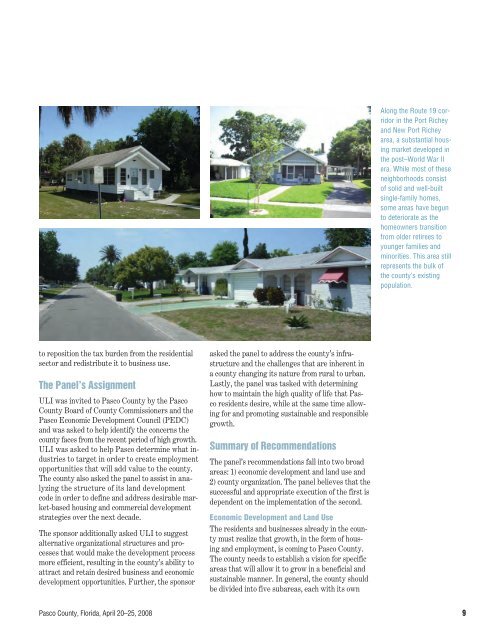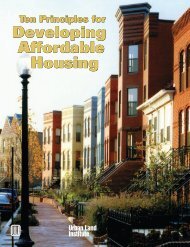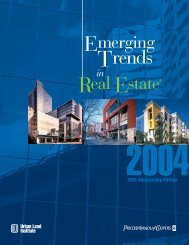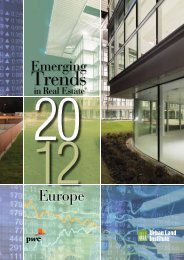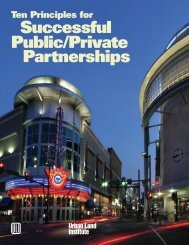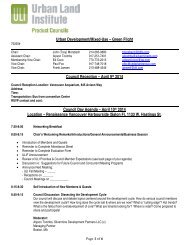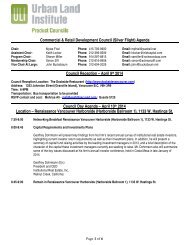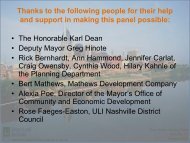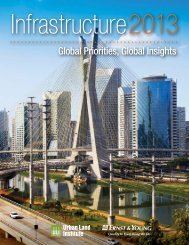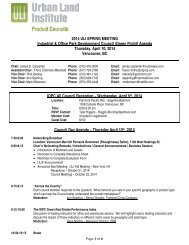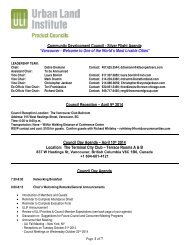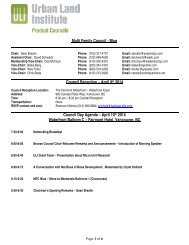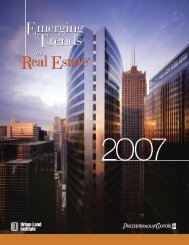Pasco County, FL - Urban Land Institute
Pasco County, FL - Urban Land Institute
Pasco County, FL - Urban Land Institute
You also want an ePaper? Increase the reach of your titles
YUMPU automatically turns print PDFs into web optimized ePapers that Google loves.
Along the Route 19 corridor<br />
in the Port Richey<br />
and New Port Richey<br />
area, a substantial housing<br />
market developed in<br />
the post–World War II<br />
era. While most of these<br />
neighborhoods consist<br />
of solid and well-built<br />
single-family homes,<br />
some areas have begun<br />
to deteriorate as the<br />
home owners transition<br />
from older retirees to<br />
younger families and<br />
minorities. This area still<br />
represents the bulk of<br />
the county’s existing<br />
population.<br />
to reposition the tax burden from the residential<br />
sector and redistribute it to business use.<br />
The Panel’s Assignment<br />
ULI was invited to <strong>Pasco</strong> <strong>County</strong> by the <strong>Pasco</strong><br />
<strong>County</strong> Board of <strong>County</strong> Commissioners and the<br />
<strong>Pasco</strong> Economic Development Council (PEDC)<br />
and was asked to help identify the concerns the<br />
county faces from the recent period of high growth.<br />
ULI was asked to help <strong>Pasco</strong> determine what industries<br />
to target in order to create employment<br />
opportunities that will add value to the county.<br />
The county also asked the panel to assist in analyzing<br />
the structure of its land development<br />
code in order to define and address desirable market-based<br />
housing and commercial development<br />
strategies over the next decade.<br />
The sponsor additionally asked ULI to suggest<br />
alternative organizational structures and processes<br />
that would make the development process<br />
more efficient, resulting in the county’s ability to<br />
attract and retain desired business and economic<br />
development opportunities. Further, the sponsor<br />
asked the panel to address the county’s infrastructure<br />
and the challenges that are inherent in<br />
a county changing its nature from rural to urban.<br />
Lastly, the panel was tasked with determining<br />
how to maintain the high quality of life that <strong>Pasco</strong><br />
residents desire, while at the same time allowing<br />
for and promoting sustainable and responsible<br />
growth.<br />
Summary of Recommendations<br />
The panel’s recommendations fall into two broad<br />
areas: 1) economic development and land use and<br />
2) county organization. The panel believes that the<br />
successful and appropriate execution of the first is<br />
dependent on the implementation of the second.<br />
Economic Development and <strong>Land</strong> Use<br />
The residents and businesses already in the county<br />
must realize that growth, in the form of housing<br />
and employment, is coming to <strong>Pasco</strong> <strong>County</strong>.<br />
The county needs to establish a vision for specific<br />
areas that will allow it to grow in a beneficial and<br />
sustainable manner. In general, the county should<br />
be divided into five subareas, each with its own<br />
<strong>Pasco</strong> <strong>County</strong>, Florida, April 20–25, 2008 9


